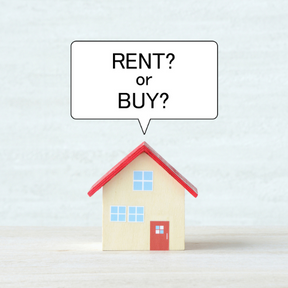
Most people dream of owning a home. However, rising real estate prices make home ownership untenable for many millennials and Gen Zs. This raises the question: should you give up the dream, and learn to enjoy the perks of renting? If you refuse to give up the idea of home ownership, how can you save for a down payment?
Here in the Northeastern BC region, we’re luckier than many parts of the country. In urban centres like Fort St. John, houses average about $350,000 – $400,000, with the upper range reaching $600,000. This is considerably cheaper than places like Vancouver, where the average price for a home is now over $1.3 million.
FRUSTRATED? YOU’RE NOT ALONE
In Canada, about 75% of those who want a home can’t afford to own.
About 70% of Canadians worry about saving up for a down payment.
One-third of younger homeowners got help from parents when purchasing their first home.
BENEFITS OF RENTING
For many, renting is a smart choice, providing flexibility and freeing up disposal income for things like travel.
- Renting can give you the flexibility to find accommodations close to work.
- If an appliance breaks or the plumbing backs up, the landlord is responsible.
- Renting allows you to diversify your investments. A house can eat into disposable income due to home repairs, property taxes and mortgage payments. Renters can sock away their money in RRSPs, TFSAs, stocks and bonds.
- If you lose your job, you can simply give a month’s notice and move across the country, if need be, for employment.
- Renters also do not need to find items considered closing costs..i.e Legal, appraisals, PTT, Down payment etc. which can add up to the overall purchase of a property and also eat into any savings.
WHAT IS A DOWN PAYMENT?
If you’re determined to stop renting, the first step to home ownership is saving for a down payment. This is a lump sum of money, usually cash, that covers a portion of the house price. You can’t get a mortgage without one. A mortgage is calculated and issued based upon the cost of the home minus the down payment.
CALCULATING A DOWN PAYMENT
In Canada, if your home’s total purchase price is less than $500,000, the minimum down payment will be 5%. If the house is priced from $500,000 to $999,999, the minimum down payment is five per cent for the first $500,000 and 10% for the remaining portion. If your down payment is less than 20% of the total purchase price, you must buy mortgage default insurance.
HOW DO I SAVE FOR A DOWN PAYMENT?
Prioritize your financial and life goals, which may mean sacrificing things like dining out, vacations to Mexico, or an extravagant wedding.
Ensure that you have a good credit rating, which will give you better interest rates on a mortgage. You should have a history of paying bills on time, and hold various financial accounts, indicating you are good at managing money.
Create a financial plan with the help of a North Peace Savings & Credit Union Advisor, who will show you how to find ways to cut spending.
Pay off your debts, especially credit card debt, which will qualify you for a mortgage with lower interest rates.
Borrow from your Registered Retirement Savings Plans (RRSP). You can borrow up to $35,000 tax free to put towards a new home. Together, you and your partner could have a $70,000 nest egg for a down payment and mortgage. You must pay the funds back within a 15-year period.
The First-Time Home Buyer Incentive is a shared-equity mortgage with the Government of Canada that helps reduce monthly mortgage payments. First-time home buyers receive 5% to 10% of the total purchase cost of a newly constructed home and 5% for an existing or pre-built home. This amount is added to a down payment, thus decreasing the size of a mortgage. Home buyers must repay the incentive within 25 years or when the property is sold, whichever comes first.
Use savings from your Tax-Free Savings Accounts (TFSA), which you don’t have to pay back, unlike an RRSP.
Talk to a North Peace Savings & Credit Union Advisor to help you achieve your financial goals.